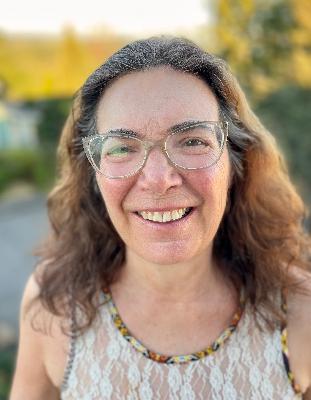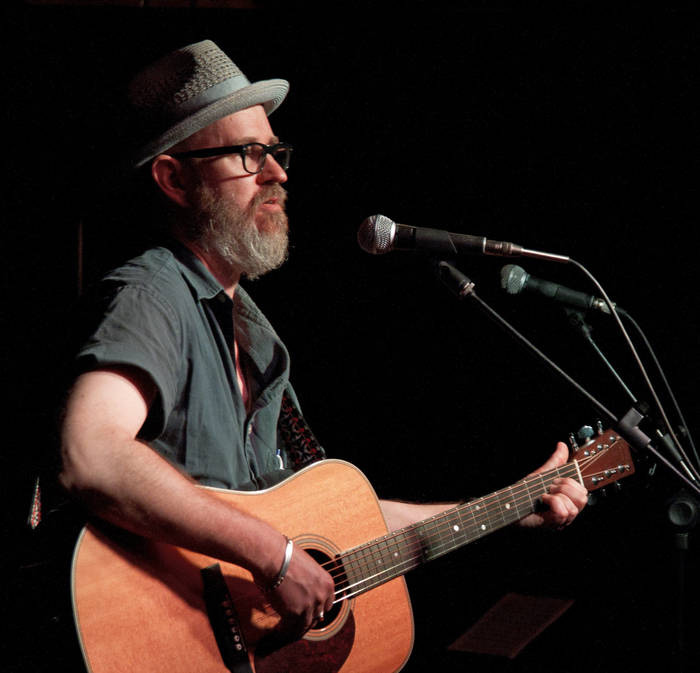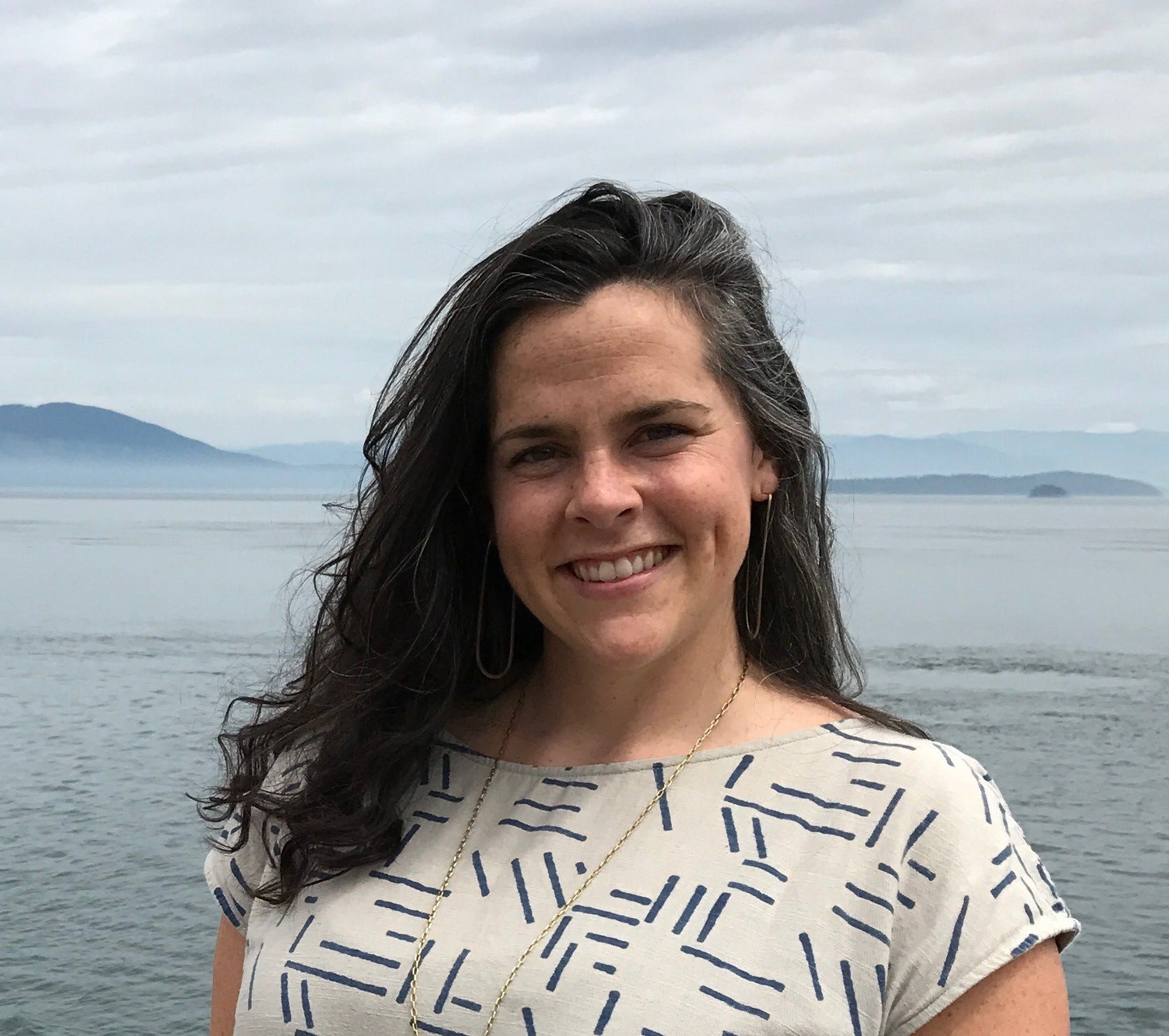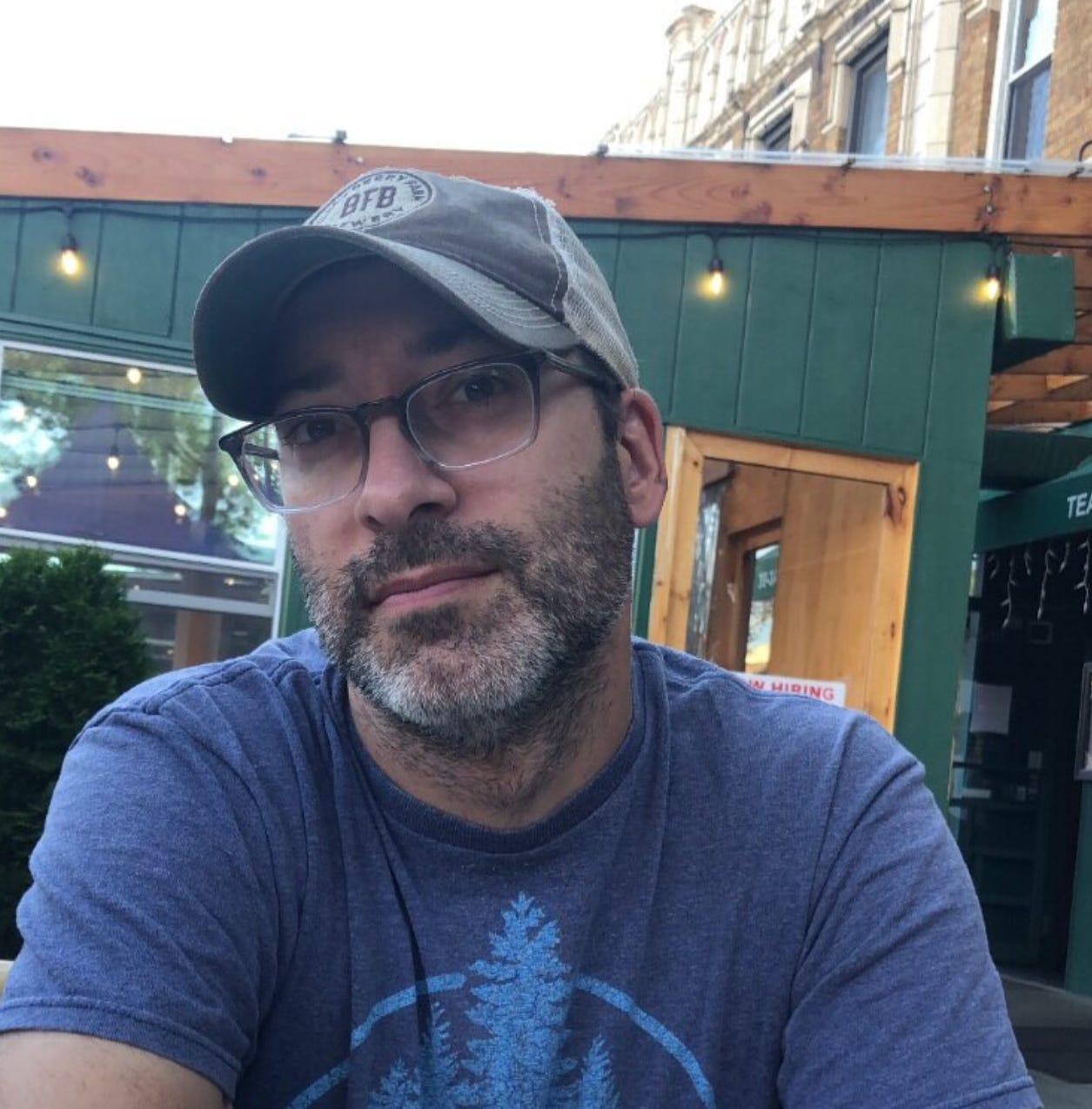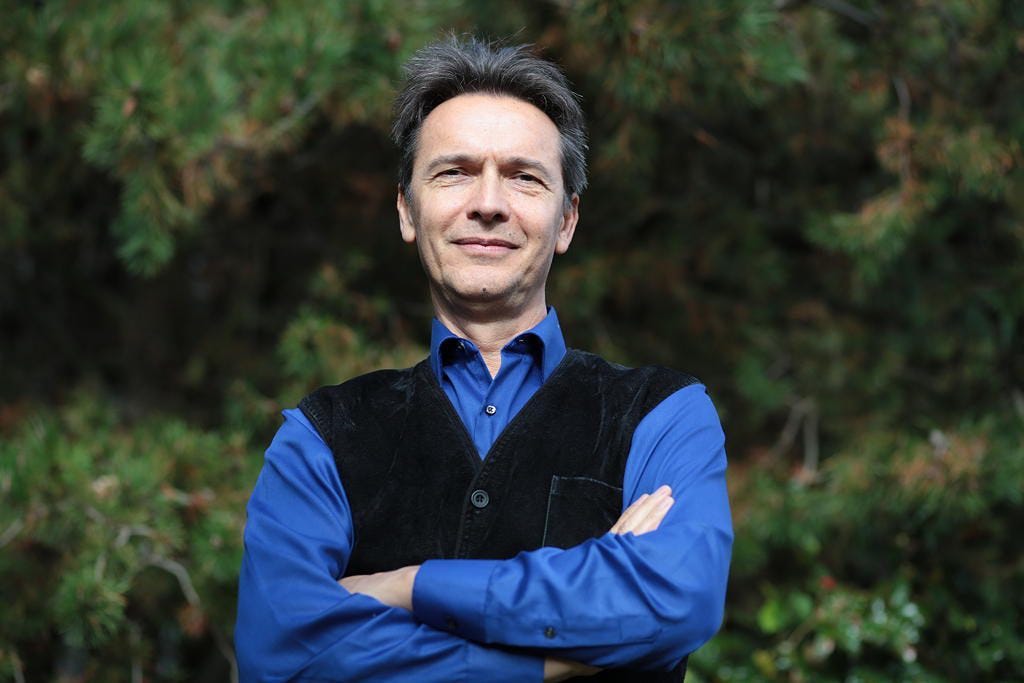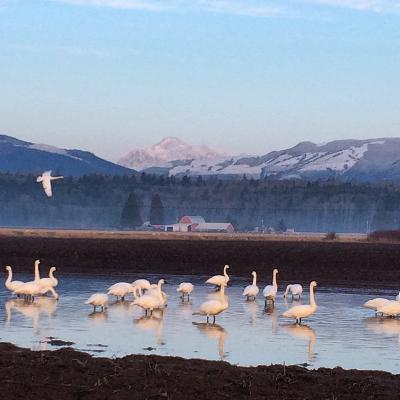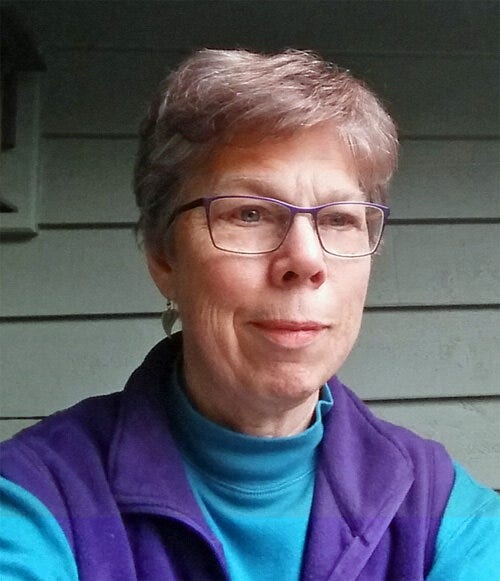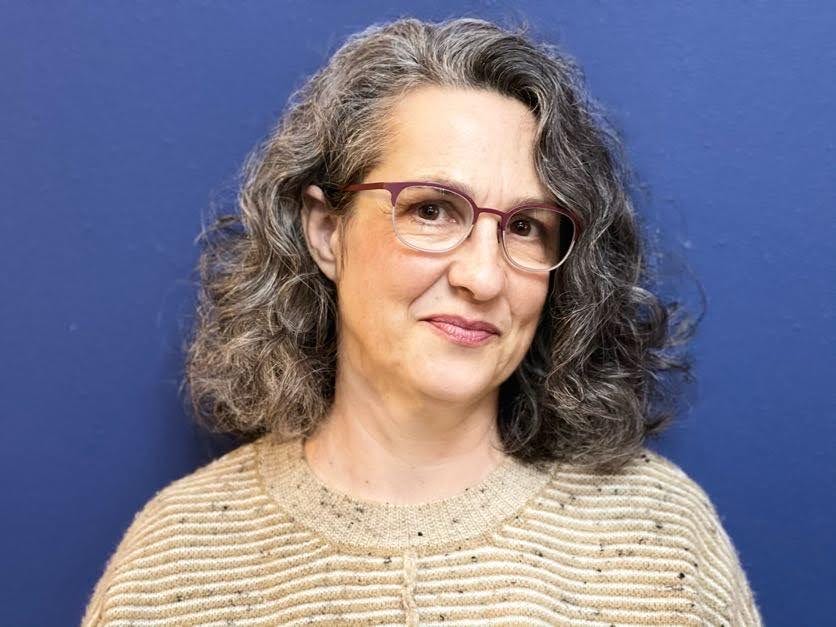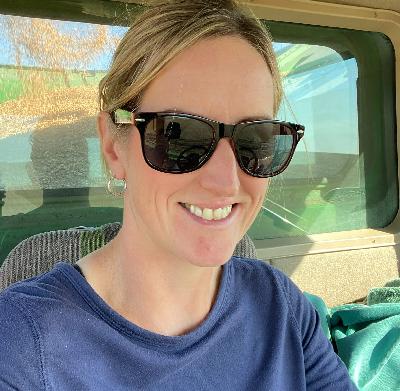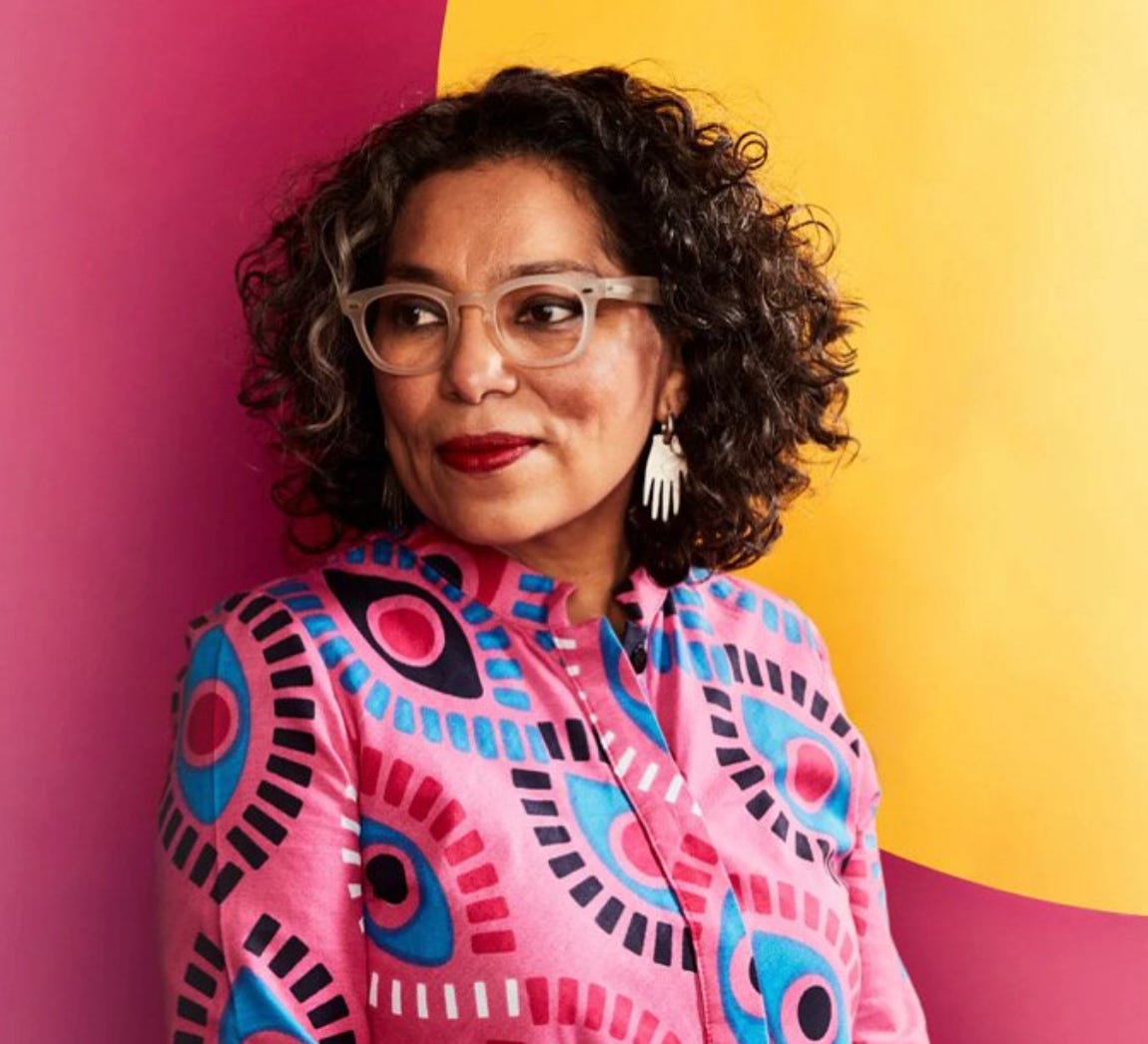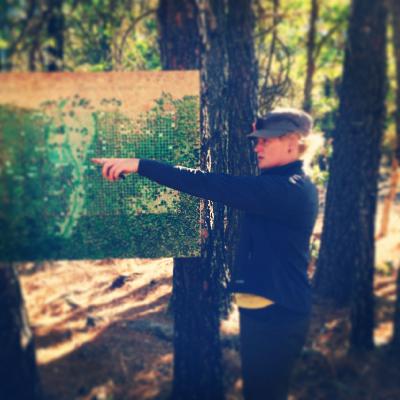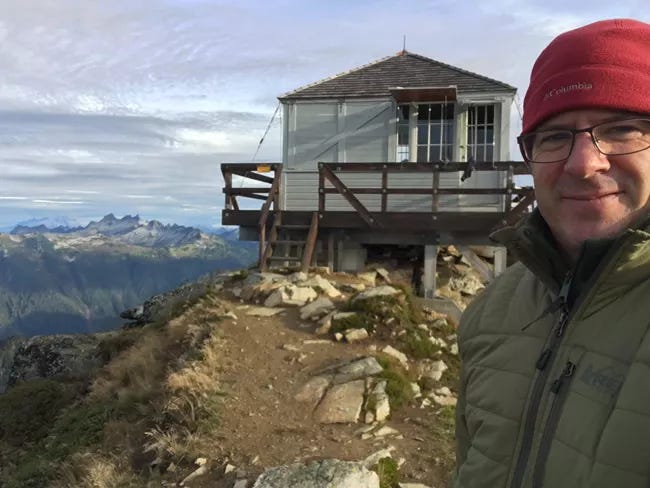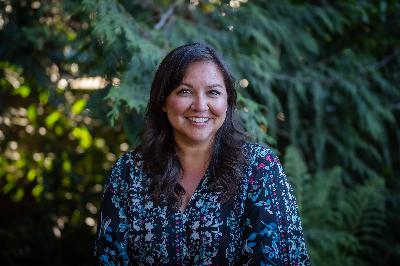Discover Her Deepest Ecologies: The Podcast
Her Deepest Ecologies: The Podcast

Her Deepest Ecologies: The Podcast
Author: Jessica Gigot, PhD
Subscribed: 3Played: 3Subscribe
Share
© Jessica Gigot
Description
We are at a turning point on this planet and in this country. In conversation with a wide range of artists, makers, creators, and caretakers, this podcast takes on two fundamental and interconnected questions:
How do we care for ourselves and each other?
How do we nurture the Earth?
herdeepestecologies.substack.com
How do we care for ourselves and each other?
How do we nurture the Earth?
herdeepestecologies.substack.com
14 Episodes
Reverse
“I am always finding inspiration out there.” In April, during National Poetry Month, I had the chance to talk with Martha Silano about her writing process, her poetry teachers, her new book (This One We Call Ours, winner of the 2024 Blue Lynx Prize in Poetry) and her recent ALS diagnosis. This conversation was a real gift after taking multiple poetry classes with Martha over the past several years. After this interview, I attended Martha’s book launch in September 2024 at Third Place Books in Seward Park and it was incredible to see her community of family, friends, and poets there to support this book and read poems on her behalf. Terrain.org offered a similar reading online and that link is below. Martha has two more books (Terminal Surreal (Acre Books, 2025), Last Train to Paradise: New and Selected Poems (Saturnalia Books, 2025)) scheduled for release in 2025 and she continues to publish her work widely. Martha’s BioMartha Silano’s poetry collections include Terminal Surreal (Acre Books, 2025), Last Train to Paradise: New and Selected Poems (Saturnalia Books, 2025), This One We Call Ours (Lynx House Press, 2024), winner of the 2023 Blue Lynx Prize, Gravity Assist (Saturnalia Books, 2019), Reckless Lovely (Saturnalia Books, 2014), and The Little Office of the Immaculate Conception (Saturnalia Books, 2011). Her awards include North American Review’s James Hearst Poetry Prize and The Cincinnati Review’s Robert and Adele Schiff Award.A Tribute to Martha Silano by Eleven Poets: An Online Reading Hosted by Terrain.orgPossible DiagnosisWhat’s that stone, that one stone edgingtoward the edge? In Italian, for spider,say ragno. Say webin a musical spell. I was with a friend,on my last round. When I told herI might be dying,she was my dictator of snow, holding meand my gone-berserk nerves.I told her my motherputs the relevant clues in crossword puzzles:Riley, refs, and palomas. Isn’t shethe best cheerer-upper ever?Maybe I’m a witch for the drama cauldron,maybe I just need more sleep, morenooky, cookies-n-cream.Old and unheavy, in need of rest. God?I don’t quite believe, but at nightI let myself go fetal,hands pressed like that plastic pair Svennie foundat a thrift store in Shelton. To breathe.To swallow. Now I understand:incurable might not be the worst thing. Upsides, like creasingthe cloth napkins, carrying them down to their homein a living room drawer,admiring the spotted towhee making a ruckus in dead leaves.I thought it would be like a thumb coming downon a spider’s body, but it was not.Published in The ShoreMore about Terminal Surreal coming September 2025 in University of Washington Magazine. Self-Elegies recently published on the poetryfoundation.org.Her Deepest Ecologies is recorded at Jack Straw Cultural Center in Seattle, WA. Thanks to their Artist Support Program and studio engineer Ayesha Ubayatilaka. All episodes are available on Substack, Apple Podcasts, and Spotify. This podcast is free and available to anyone. For more information or to be considered for a future episode, reach out via email at: jessicagigot@gmail.com. This is a public episode. If you would like to discuss this with other subscribers or get access to bonus episodes, visit herdeepestecologies.substack.com
“I am concentrating on playing live in front of as small an audience as possible.”I have always loved Louis Ledford’s music and his captivating storytelling. I enjoyed the chance to talk about songwriting, his life as an artist, and his move to Bellingham from New Orleans. He performs regularly in and around Bellingham, hosts a radio show, and curates music for the Honey Moon. After doing a lot of virtual performances during the pandemic, I appreciate his focus right now on playing live, intimate shows where he can “make eye contact” with his audience.I have included some videos and links below and featured two of my favorite Louis songs in the interview—enjoy!Louis’ Bio:Born in the American South, Louis Ledford has carved out a career composing and performing literate Americana roots music. He has produced three solo recordings in association with Waterbug Records, a relationship which began in 2005 when Ledford met label owner Andrew Calhoun at the legendary Texas Kerrvile Folk Festival. Louis has collaborated with folk diva Anais Mitchell on several projects including his singing the role of Hades for a early roadshow performing songs that became the bones of her Tony winning Broadway musical Hadestown. Mitchell recorded his song “When You Fall” for her collaborative album Country EP with Rachel Ries released by Ani Difranco’s Righteous Babe Records.His songs are three and one half minute stories that detail seemingly real characters who rise and fall to the melody and rhythm of a piedmont style finger picked guitar. You will hear echoes of Willie Nelson and Guy Clark in his voice. His arrangements invoke c&w, tin pan alley, beatles and the blues.https://louisledford.bandcamp.com/album/treebranch-and-moonlighthttps://www.louisledfordmusic.com/Listen to Louis on the Radio:Unknown Fidelity on Bellingham’s KZAXhttps://www.mixcloud.com/UnknownFidelity/Music in podcast:Big Fat Moon, from Century Plant on Esplanade Ave., 2012A Farm in New Hampshire, from Treebranch and Moonlight, 2010Learn About the The Subdued Stringband Jamboree: August 7, 8, and 9th, 2025Her Deepest Ecologies is recorded at Jack Straw Cultural Center in Seattle, WA. Thanks to their Artist Support Program and studio engineer Ayesha Ubayatilaka. All episodes are available on Substack, Apple Podcasts, and Spotify. This podcast is free and available to anyone. For more information or to be considered for a future episode, reach out via email at: jessicagigot@gmail.com.https://herdeepestecologies.substack.com/ This is a public episode. If you would like to discuss this with other subscribers or get access to bonus episodes, visit herdeepestecologies.substack.com
“We’ve extracted all the materials we really need to clothe ourselves.”My sister has worked in the textile and apparel industry for many years. Her work is focused on sustainability and we had a great discussion about clothing, waste, fabric quality, fiber types and processing, and the future of textiles. As someone who has been focused on sustainable food systems, it was very illuminating to learn about the potential and obstacles associated with sustainable supply chain management in apparel. Our conversation tackled the life cycle of a shirt, which brought up a variety of ideas, initiatives, and complexities around sustainability.I have created a glossary of terms below and included some additional links.Emily’s Bio:Emily is a Seattle-based corporate sustainability leader. With diverse experience spanning apparel, international community development and sustainability, she’s a Pacific Northwesterner who’s happy to be back in Seattle after years living and working in Los Angeles, Thailand and Peru. She holds an MBA in Sustainable Business a BA in Diplomacy and World Affairs.Glossary of Terms* Circularity-keeps materials moving through reuse, repair, redistribution, and recycling. This is the most powerful way to preserve natural resources and minimize emissions that cause climate change.* Microfiber-a polyester and nylon (polyamide) fiber that is used to make fabric. The fiber is split many times smaller than a human hair. * Fiber Fragment-*updated* term for microfiber. They have a negative impact on our environment and our health too. They shed due to chemical processing, mechanical stress and natural weathering. They are released and transferred through waterways, air and soil.* Global Organic Textile Standard-developed by leading standard setters to define world-wide recognized requirements for organic textiles. From the harvesting of the raw materials, environmentally and socially responsible manufacturing to labelling, textiles certified to GOTS provide a credible assurance to the consumer.* Fast Fashion-widely considered to be low-quality apparel produced rapidly to follow current trends in the industry and sold at rock-bottom prices. Although the monetary cost is low, textile workers and the environment are paying a high price. Fast fashion is cheap because workers are not paid adequately. Clothes are poorly made, widely purchased, rarely worn and quickly thrown away.* Man-made cellulosics -regenerated fibers usually made from the dissolved wood pulp or “cellulose” of trees. Viscose, lyocell, and modal are all kinds of man-made cellulosics. Because they’re plant-based, MMCFs are renewable, and so have the potential to be a climate-friendly material if the wood is sourced sustainably and the processing chemicals are handled properly.* Responsible Textile Recover Act-California Gov. Gavin Newsom signed this into law October 2024, making apparel and textile producers responsible for creating a plan to collect, repair and recycle their products.* Threadcycle in King County* Knits, Wovens, Non-Woven FabricsEmily referenced Ghana in our talk. I wanted to share this recent and important PBS feature (November 2024) on waste in the textile industry. Her Deepest Ecologies is recorded at Jack Straw Cultural Center in Seattle, WA. Thanks to their Artist Support Program and studio engineer Ayesha Ubayatilaka. All episodes are available on Substack, Apple Podcasts, and Spotify. For more information or to be considered for a future episode, reach out via email at jessicagigot@gmail.com. This is a public episode. If you would like to discuss this with other subscribers or get access to bonus episodes, visit herdeepestecologies.substack.com
“I have been a father for almost thirteen years and it’s a primary part of my identity. My poetry is me figuring myself out as much as it is figuring the world out for them.”I met Jared online during a Hugo House workshop I taught in 2021 called the Five Stage of Ecological Grief. We have stayed in touch and I appreciate how his first book Who Will Cradle You Head investigates the space where ecological grief, climate change, and fatherhood overlap. Sasquatch also figures prominently! In our conversation, we talk about writing through parenthood and the power and limitations of ecopoetry. Thank you for listening!Contextualizing a Forest Fire Continually Burningafter Erika Meitner's "Outside the Frame"Outside the frame a toppled tree, a burning telephone pole, our wish to call our father who is reading headlines drinking coffee, steam rising from the rim to his face, a pleasant heat. Outside the frame melting asphalt, a sea of tar, friction and tires, a bus sinks into the road’s dark bed before pushing off for the day’s commute. Outside the frame particulate matter helixed in a window’s light, a wheezing refrigerator in an apartment that won’t cool down, a son teaching his mother what wet bulb temperatures are before she changes the subject to describe a new mask for sleep apnea. Outside the frame troubled sleep and orange skies. Outside the frame, brunch across from the park where children are playing, the stacking of spoons, cream gyres in refilled cups of coffee. Outside the frame a television’s light flickers against our walls, tourists running toward waves, aerial views of refugees carpeting boat decks until we are floating above flames to a panorama of char and embers, a ragged orange line across the horizon and we rise to the smoke’s dim curtain, the white sun that burns behind it and we lift higher still, through the thermosphere, sunset-singed clouds, contrails drawing new borders into a map of loss as we catch the sun along the earth’s curve and we realize all this time we’ve been burning together.Published in ASP Bulletin.https://theaspbulletin.com/contextualizing-a-forest-fire-continually-burning-jared-beloff/Jared’s Bio:Jared Beloff is the author of the Who Will Cradle Your Head (ELJ Editions, 2023).He earned degrees at Rutgers University (BA in English) Johns Hopkins University (MA in English Literature, specializing in the novel and Romantic/18th Century Literature).Jared has been an adjunct professor at Queensborough Community College, an English teacher and a teacher leader in NYC public schools for 17 years.Jared is currently a poetry editor at The Weight Journal and Poets of Queens. His poetry can be found in AGNI, Baltimore Review, Rust & Moth, Crab Creek Review and elsewhere. His work has been nominated for Best of the Net and the Pushcart Prize. He lives with his wife and two daughters in Queens, NY.https://www.jaredbeloff.com/https://elj-editions.com/who-will-cradle-your-head/Her Deepest Ecologies is recorded at Jack Straw Cultural Center in Seattle, WA. Thanks to their Artist Support Program and studio engineer Ayesha Ubayatilaka. All episodes are available on Substack, Apple Podcasts, and Spotify. This podcast is free and available to anyone. For more information or to be considered for a future episode, reach out via email at: jessicagigot@gmail.com.https://herdeepestecologies.substack.com/ This is a public episode. If you would like to discuss this with other subscribers or get access to bonus episodes, visit herdeepestecologies.substack.com
“I use the language of ecology all the time in my preaching.”This interview was a real joy for me and a reunion of sorts. Andi Lloyd was my advisor in college, back when I was a biology major. At the time, she was teaching and doing research as a forest ecologist and professor and later became Dean of the Faculty and Vice President for Academic Affairs at Middlebury College. However, we discuss how her trajectory in life shifted dramatically. She is now a pastor in the United Church of Christ and has co-authored the book Letters from the Ecotone: Ecology, Theology, and Climate Change with Andrew Nagy-Benson.Letters from the Ecotone invites readers into an open-hearted dialogue between friends—a scientist and a pastor. In a series of letters written during the pandemic, Lloyd and Nagy-Benson explore the realities of climate change from the perspectives of ecology and Christian theology. The authors seek common ground, where science and religion meet and share a vision of flourishing life on earth. At a time when the climate crisis is quickly emerging as an existential threat, this book charts a journey imbued with the insights of ecological science and the wisdom of the Christian tradition.Excerpt from Andi’s bio:I was born in Connecticut, and have lived most of my life in New England. Graduate school in biology & ecology took me west for several years, to Alaska and then Arizona, after which I returned to New England to teach at Middlebury College in Vermont. I was a professor of biology at Middlebury from 1996 until 2020; I served as the Dean of the Faculty and Vice President for Academic Affairs from 2012 through June, 2019. In my work as an ecologist, I studied the effects of climate change on forests in Alaska and Siberia. I had the great fortune to spend most summers – often with students at my side – in Alaska, studying treeline forests. During my time at Middlebury, I taught classes on plant ecology, evolution, and climate change.I left Middlebury College in June of 2019 to pursue a call to ordained ministry in the United Church of Christ. That journey took me back to Connecticut, to the Andover Newton Theological Seminary at Yale Divinity School. I graduated in May of 2022, and on June 5, 2022 was ordained to ministry in the United Church of Christ. I am currently serving as the pastor of the Trinitarian Congregational Parish of Castine, Maine.Although I have left the world of doing science behind, my interest in climate change and creation justice and my passion for ecology continue to inform my understanding of the ministry to which I am called.Blessing for When the Night Is LongWhen the night is long.When the dark is deep.When doubt presses in.When not alone is distant memory and a dream too far.Then, may this blessing remind you:morning will come.You’ll hear itbefore you see it;the soul, too, has a dawn chorus.So,get quiet,incline your eareastward, andlistenfor a whisper of grace,a voice not your own,saying,take heart, dear one,morningis coming.Do you hear it?Let the promise settle upon you,peace after storm,and then be stillandknow:dawn’s tendrils are alreadyyearning their way toward you —like dewfall’s caress,a Presence felt, not listened to,a sudden assurance,born not of wordsbut a bone-deep knowing that hasbeen there all along,that you arenot alone, beloved.Do you feel it?Mercy, too, comesjust before the dawn.I can’t explainwhat happens next:that morning will come is a fact,butthe fact that it does comestill feels like pure andunabashedmiracle.Let it come.Let it bring you, grateful andunashamed of your need,to your knees.Let it break youwide open —like cloudburst,like budbreak,like the brightly breaking dawn:this one, right here,that beckons you,that calls youto live,to breathe,expandwithlight.(I wrote this on 5/3/2023 – the 8th day of a silent retreat at Eastern Point Retreat House in Gloucester, MA. The last five lines were the ending of a poem fragment written by my grandfather, Norman Lloyd, in the 1960s or 1970s.)Her Deepest Ecologies is recorded at Jack Straw Cultural Center in Seattle, WA. Thanks to their Artist Support Program and studio engineer Ayesha Ubayatilaka. All episodes are available on Substack, Apple Podcasts, and Spotify. For more information or to be considered for a future episode, reach out via email at jessicagigot@gmail.com. This is a public episode. If you would like to discuss this with other subscribers or get access to bonus episodes, visit herdeepestecologies.substack.com
“There is something about the sound of a symphony orchestra that speaks to people universally.”In the first episode of the second season, I am thrilled to talk with composer, Grammy-nominated conductor, and guitarist Christophe Chagnard. In our conversation, I enjoyed learning about his pivotal project, Terra Nostra, and the ways he believes art can impact climate change and education.Christophe is the founder of Earth Creative, which he describes as a legacy project that has a mission to use the power of the arts to raise awareness about climate change to advance climate justice for all. I appreciate Christophe’s passion for education and his deep sense of responsibility to address the climate crisis through creative and interdisciplinary means. As a member of Earth Creative, I have enjoyed getting to know Christophe over the past year. Beyond his incredible musical talent, I value his inclusive nature and verve for organizing and inspiring people to take action. Enjoy our conversation!Christophe’s Bio:Engagement through creativity has been at the core of Christophe Chagnard’s philosophy throughout his distinguished career. As a composer, his music addressed pressing global issues such as systemic racism, climate change, intolerance, and social injustice. His latest works “Gaman” (2017) and “Terra Nostra” (2019) address systemic racism and climate change respectively. As a Grammy-nominated conductor, Christophe Chagnard has led a vast repertoire of symphonic, operatic, and ballet works of all styles and periods. He has also spent three decades making the concert hall accessible to all, addressing the elitist stereotype that plagues this art form. As a guitarist, he explores a wide array of styles and traditions together in genre-defying creations intended to present an open and inclusive voice that transcends labels.Terra Nostrahttps://terranostra.org/Terra Nostra shows the beauty of the natural world and the threats faced by it. No previous experience with or knowledge of classical music is needed to be touched by Terra Nostra. It makes climate change urgent and visceral through music and photographs, stimulates people to challenge themselves to learn more about the issues, and motivates them to see what practical steps they can take in their own lives and communities.https://www.christophechagnard.world/https://earthcreative.org/Her Deepest Ecologies is recorded at Jack Straw Cultural Center in Seattle, WA. Thanks to their Artist Support Program and studio engineer Ayesha Ubayatilaka. All episodes are available on Substack, Apple Podcasts, and Spotify. For more information or to be considered for a future episode, reach out via email at jessicagigot@gmail.com.https://herdeepestecologies.substack.com/https://jessicagigot.com/ This is a public episode. If you would like to discuss this with other subscribers or get access to bonus episodes, visit herdeepestecologies.substack.com
In Part 2, we dive into some of the major issues facing the health and survival of migratory swans, including habitat degradation, lead poisoning, and Highly Pathogenic Avian Influenza Virus (HPAIV). Below are some links to the places and topics that came up in our conversation. You can ready Martha’s Bio in Part 1.“If you see a sick duck, goose, swan, or even a bird, do not pick it up. Do not put it in your car. Do not transport it.”This is an article by Washington Department of Fish & Wildlife about the return of the swans to Washington. In our conversation, Martha also mentioned a resident swan on Whidbey Island and issues with swan die-off and lead poisoning at Judson Lake.See Martha Jordan at Christianson’s Nursery for her talk on Snow Geese on December 2nd from 10:30-12. Pre-registration is required.Visit the Martha Jordan Birding Trail at Leadbetter Point State Park.An article from last November in the Cascadia Daily on the Highly Pathogenic Avian Influenza Virus (HPAIV).As a reminder, it is important to not pick up any dead or dying swans because HPAIV is transmissible to humans and dogs. Here is how to report:Wildlife biologists, Puget Sound Energy employees, and volunteers from Northwest Swan Conservation Association work hard to respond to reports of sick, injured, and dead swans.To report, call 360–466–0515. Leave a short, detailed message with your name, number, location, and the swan’s condition. This is a public episode. If you would like to discuss this with other subscribers or get access to bonus episodes, visit herdeepestecologies.substack.com
I loved the chance to talk with Martha Jordan about migratory Trumpeter swans and other migratory wildfowl. I met Martha twenty years ago at one of her education talks. As a swan enthusiast, I have so much more to learn from her. In fact, there was so much to discuss, I turned my interview with her into two episodes. Part 1 focuses on Martha’s work with swans, Trumpeter swan distribution and populations in North America, and a look at the history of swan monitoring and conservation in the northwest. Part 2 will be out on November 28th!“That’s what the birds were telling us.”About Martha:Martha Jordan is the founder and Executive Director of the NWSCA. She received her wildlife science degree from Oregon State University, Corvallis. Her interest in swans began in the late 1970s while working with collared snow geese in the Skagit Valley near Mt. Vernon, Washington. Martha has been a major contributor to state and federal agencies, documenting the status of Trumpeter Swans in the state of Washington, helping to protect key habitats and reduce mortality from lead poisoning and powerline collisions, and helping in development of the first Washington State section of the Pacific Flyway Trumpeter Swan Management Plan.In the early 1980s she established the Washington Swan Working Group (later known as the Washington Swan Stewards), affiliated with The Trumpeter Swan Society. She chaired this group from its’ beginning until 2015 when she founded Northwest Swan Conservation Association. Martha served as a Board member of The Trumpeter Swan Society from 1985-2009. She left TTSS in 2015 to found NWSCA and brings her many decades of expertise to build strong partnerships that will promote the welfare and vitality of both Trumpeter and Tundra swans in Washington and throughout the northwest region.Find out more about NWCA here: https://nwswans.org/ This is a public episode. If you would like to discuss this with other subscribers or get access to bonus episodes, visit herdeepestecologies.substack.com
“We are with the trees every day, we live with them.”This interview was extra special because I had a chance to talk with my fellow Oregon State University Press author, Ann Stinson. I met Ann in Portland last April when we had a reading together at Broadway Books. I loved the chance to compare and contrast farming and forestry and I appreciated the chance to discuss her beautiful memoir, The Ground at my Feet: Sustaining a Family and a Forest, and the history of family forests in the Pacific Northwest.Ann Stinson grew up near Toledo, Washington. After high school, her interests took her to Japan, New York City, and Portland, Oregon. She earned a BA in English from Western Washington University and a MA in East Asian Languages and Culture from Columbia University. A former school teacher, she is president of the Family Forest Foundation and is on the board of the Washington Farm Forestry Association.About the Book:The Ground at My Feet is a memoir about loss and grief as well as a portrait of a family, a region, and an industry. Combining personal story and research, Stinson weaves essays, poems, history, and science into a rich and layered account of life in a family forest in the Pacific Northwest. She maps interactions between the land and its people over two centuries: the Cowlitz peoples, homesteaders, and several generations of logging families who have worked the property. She follows her family’s logs as they become lumber for fence boards and suburban homes, touring a local cedar mill and traveling with her father to visit mills in Japan.Stinson adds a landowner’s voice to conversations about the human tendency to demand more of the land than it can sustain. With its uniquely personal view of the Pacific Northwest’s timber and forestry heritage, The Ground at My Feet is an engaging addition to the literature of the landscape and ecology of the West.* Information on The Family Forest Foundation* For more information & videos visit Ann Stinson’s Writing WorldTree Books Mentioned:Finding the Mother Tree: Discovering the Wisdom of the Forest by Susan SimardThe Overstory by Richard Powers This is a public episode. If you would like to discuss this with other subscribers or get access to bonus episodes, visit herdeepestecologies.substack.com
I encountered Lewellyn’s book at our local bookstore, The Book Shucker, in Edison, WA. Immediately, I appreciated her work as a farmer and mental health advocate. She describes her book Rooted: How I Stay Small-Town Strong When Life Gets Hard and How You Can Too as a “prescriptive memoir” and I enjoyed the balance of story and practical advice that she offers her readers (as well as a Spotify playlist!). Books centered on, or even adjacent to, “farming” or “agriculture” often get overlooked. In our conversation, we talk about the marginalization of rural life and things that can be done to not only champion the vocation of farming, but also how to de-stigmatize mental health issues in rural communities. Thanks for listening!Lewellyn is a journalist by trade and a farmer by choice. She has a passion for growing everything from wheat and canola to a vegetable garden, chickens, and two farm kids. Lewellyn worked as a reporter and anchor at CKX television in Brandon, Manitoba before turning her focus to farming alongside her husband, but writing continues to be her passion. Her new book Rooted is a prescriptive memoir that tells the story of her own struggles with anxiety and depression and offers tips on how to stay small town strong when things get tough. Mental health is one of the biggest threats to rural communities, and Lewellyn has made it her life’s work to start more discussions around this topic, advocating for agriculture, women, and mental health.Check out Lewellyn’s website: https://www.lewellynmelnyk.com/Order a copy of ROOTED!All episodes were recorded at Jack Straw Cultural Center in Seattle, WA and edited at my farm in the Skagit Valley called Harmony Fields. Thank you to sound engineer Ayesha Ubayatilaka.We have seven fascinating conversation in season one that will be released in spring and fall 2023!Please send any comments or questions to: jessicagigot@gmail.comNOTE: All podcast episodes are available for free, no paid subscription required. This is a public episode. If you would like to discuss this with other subscribers or get access to bonus episodes, visit herdeepestecologies.substack.com
I have seen Claudia Castro Luna perform at the Skagit River Poetry Festival and have admired her poetry for a long time. Her latest book, Cipota Under the Moon, which came out last May “scores a series of poems as an ode to the Salvadoran immigrant experience in the United States.” I have always appreciated how ecopoetics and social justice appear seamlessly in Claudia’s work and in this conversation I wanted to talk more about how she addresses beauty, place, and community. She has served as both Seattle Civic Poet and Washington State Poet Laureate and is currently a Writing the Land poet. Enjoy this conversation! Claudia Castro Luna is an Academy of American Poets Poet Laureate fellow (2019), WA State Poet Laureate (2018 – 2021) and Seattle’s inaugural Civic Poet (2015-2018). She is the author of Cipota Under the Moon (Tia Chucha Press, 2022); One River, A Thousand Voices (Chin Music Press); the Pushcart nominated Killing Marías (Two Sylvias Press) also shortlisted for WA State 2018 Book Award in poetry, and the chapbook This City (Floating Bridge Press). Her most recent non-fiction is in There’s a Revolution Outside, My Love: Letters from a Crisis (Vintage). Born in El Salvador, Castro Luna arrived in the United States in 1981. Living in English and Spanish, she writes and teaches in Seattle on unceded Duwamish lands where she gardens and keeps chickens with her husband and their three children.https://www.claudiacastroluna.com/https://poets.org/poem/farmers-marketResources mentioned:Writing the Land projecthttps://www.seattle.gov/arts/programs/civic-poethttps://www.humanities.org/program/wa-poet-laureate/All episodes were recorded at Jack Straw Cultural Center in Seattle, WA and edited at my farm in the Skagit Valley called Harmony Fields. Thank you to sound engineer Ayesha Ubayatilaka.We have four fascinating conversation in season one that will be released weekly-ish, starting on April 22nd on Substack!Please send any comments or questions to: jessicagigot@gmail.comNOTE: All podcast episodes are available for free, no paid subscription required. This is a public episode. If you would like to discuss this with other subscribers or get access to bonus episodes, visit herdeepestecologies.substack.com
I loved talking with my dear friend Jodie Buller about her work at the White Eagle Memorial Preserve, a Natural Burial Ground at Ekone Ranch. She spends part of her time near me in western Washington, but one of her many roles is as Cemetery Director on the other side of the mountains in Goldendale, WA. This was an extra special conversation since Jodie and I used to host a radio show for our local station (KSVR, 91.7) in the years before she took on this important work. I appreciated what I learned about the process of natural burial, how ceremony is created, and the healthful ways we can think about and prepare for death. Jodie has been a friend of Ekone since 2008, and stepped into leadership of White Eagle Memorial Preserve in 2013. She works with families directly to walk through end-of-life choices and burial logistics, and supports White Eagle’s Stewards, hosting tours, burials, and special events. Jodie lives part-time in the White Eagle Cabin in the Ekone Valley, and part-time in a wee cabin in Skagit Valley. Her background in outreach work for the Skagit Valley Food Co-op informs her passion to introduce White Eagle to communities throughout Washington and Oregon, with presentations and workshops on natural burial. She is a founding member of the Conservation Burial Alliance, and part of the Washington Funeral and Oregon Funeral website team, creating public service websites which provide resources for family and community directed death care.Ekone RanchWhite Eagle Memorial PreserveResources mentioned:Corpse Care: Ethics for Tending to the DeathWestern Pine Beetles & Forests in WAAll episodes were recorded at Jack Straw Cultural Center in Seattle, WA and edited at my farm in the Skagit Valley called Harmony Fields. Thank you to sound engineer Ayesha Ubayatilaka.We have four fascinating conversation in season one that will be released weekly-ish, starting on April 22nd on Substack!Please send any comments or questions to: jessicagigot@gmail.comNOTE: All podcast episodes are available for free, no paid subscription required. This is a public episode. If you would like to discuss this with other subscribers or get access to bonus episodes, visit herdeepestecologies.substack.com
In Episode 2, I talk with Kevin Craft about wilderness, writing, and his new role as a poet-in-residence for the Terminus Project in Olympic National Park. A complete bio is below as well as links to things we discussed in our conversation.Kevin Craft lives in Seattle and directs the Written Arts Program at Everett Community College. His previous books include Solar Prominence, selected by Vern Rutsala for the Gorsline Prize from Cloudbank Books (2005) and Vagrants & Accidentals, published in the Pacific Northwest Poets Series by the University of Washington Press (2017). He is the recipient of fellowships from Artist Trust, The Camargo Foundation, The Bogliasco Foundation, PLAYA, and MacDowell, among others. In 2022 he was an Artist in Residence at Olympic National Park. Editor of Poetry Northwest from 2009 – 2016, he now serves Publisher and Executive Editor of Poetry NW Editions.Terminus Project: Olympic National ParkKevin’s Poem “The Cameron Glacier: Cantata for a Melting”More of Kevin’s work here. His third book of poems, Traverse, will be coming out with Lynx House Press this in 2023.Additional notes: Reporting form for the Western toad.All episodes were recorded at Jack Straw Cultural Center in Seattle, WA and edited at my farm in the Skagit Valley called Harmony Fields. Thank you to sound engineer Ayesha Ubayatilaka.We have four fascinating conversation in season one that will be released weekly-ish, starting on April 22nd on Substack!Please send any comments or questions to: jessicagigot@gmail.comNOTE: All podcast episodes are available for free, no paid subscription required. This is a public episode. If you would like to discuss this with other subscribers or get access to bonus episodes, visit herdeepestecologies.substack.com
Welcome to the first episode of the first season of the podcast! It was a true honor to have Valerie Segrest as our first guest. Below you will find her complete bio and links to the various projects she mentioned in our conversation. Our talk covered a lot of ground, from food sovereignty to mothering to the various ways we spend time in and connect with nature. Enjoy!Valerie’s Bio:For more than a decade, Ms. Segrest has dedicated her work in the field of Nutrition and Human Health Science towards the efforts of the food sovereignty movement and catalyzing food security strategies rooted in education, awareness, and overcoming barriers to accessing traditional foods for Tribal communities throughout North America. By utilizing a community-based participatory research approach she has worked to organize tribal community members in grassroots efforts towards strengthening sustainable food systems that are culturally relevant and nutritionally appropriate.Ms. Segrest earned her Bachelors Degree in Human Nutrition and Health Sciences from Bastyr University and her Masters of Arts Degree in Environment and Community from Antioch University. Over the years she has earned several certifications in advanced herbal studies and has extensively researched the subject of historical and traditional food and medicine systems of the Coast Salish tribes of Western Washington.Her career began as faculty for Northwest Indian College and as a Cooperative Extension Agent for the Traditional Foods and Medicines Program. In 2009, she worked with her community to launch the Muckleshoot Food Sovereignty Project, a grassroots effort toward increasing access to traditional foods within the Muckleshoot community by identifying food resources, developing and implementing culturally appropriate curriculum focused on traditional ecological knowledge. Over the span of ten years, Ms. Segrest has co-authored several publications including the books “Feeding the People, Feeding the Spirit: Revitalizing Northwest Coastal Indian Food Culture” and “Feeding Seven Generations: A Salish Cookbook”.She was a Kellogg Food and Community Fellow at the Institute of Agriculture and Trade Policy. This afforded her the opportunity to share the efforts of the food sovereignty movement with audiences locally, nationally, and globally. Further, she made several important connections to the broader good food movement and key leaders in that arena. In 2019, she was featured in the Women’s Day Magazine, the Food Network Magazine, and the J.Jill “Inspired Women” Campaign.Valerie aims to inspire and enlighten others about the importance of a nutrient-dense diet through a culturally appropriate, common-sense approach to eating.Tahoma Peak Solutionshttps://www.tahomapeak.com/Native Plants and Foods Community Portalhttps://nativeplantsandfoodsportal.org/Chef vs Wild on HULUhttps://press.hulu.com/shows/chefs-vs-wild/Muckleshoot Food Sovereignty ProjectAll episodes were recorded at Jack Straw Cultural Center in Seattle, WA and edited at my farm in the Skagit Valley called Harmony Fields. Thank you to sound engineer Ayesha Ubayatilaka.We have four fascinating conversation in season one that will be released weekly-ish, starting on April 22nd on Substack! Please send any comments or questions to: jessicagigot@gmail.comNOTE: All podcast episodes are available for free, no paid subscription required. This is a public episode. If you would like to discuss this with other subscribers or get access to bonus episodes, visit herdeepestecologies.substack.com


